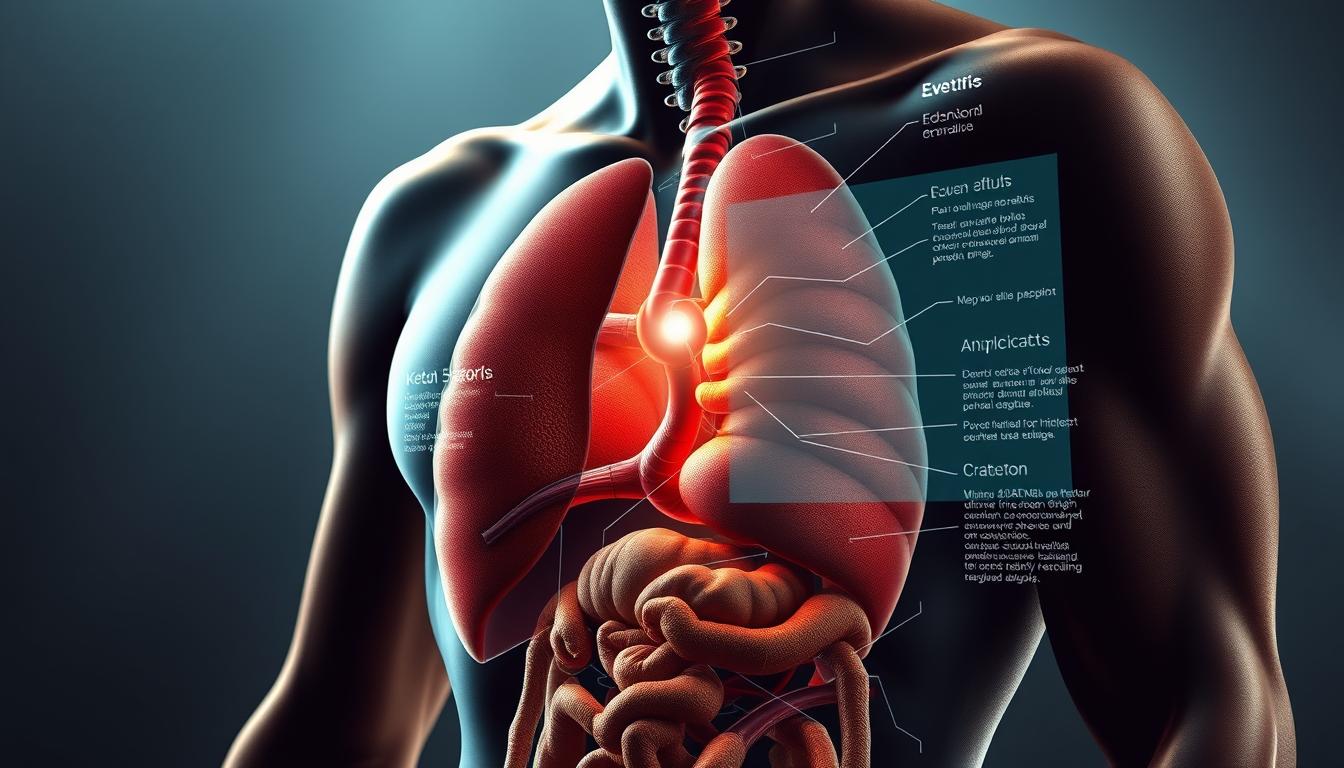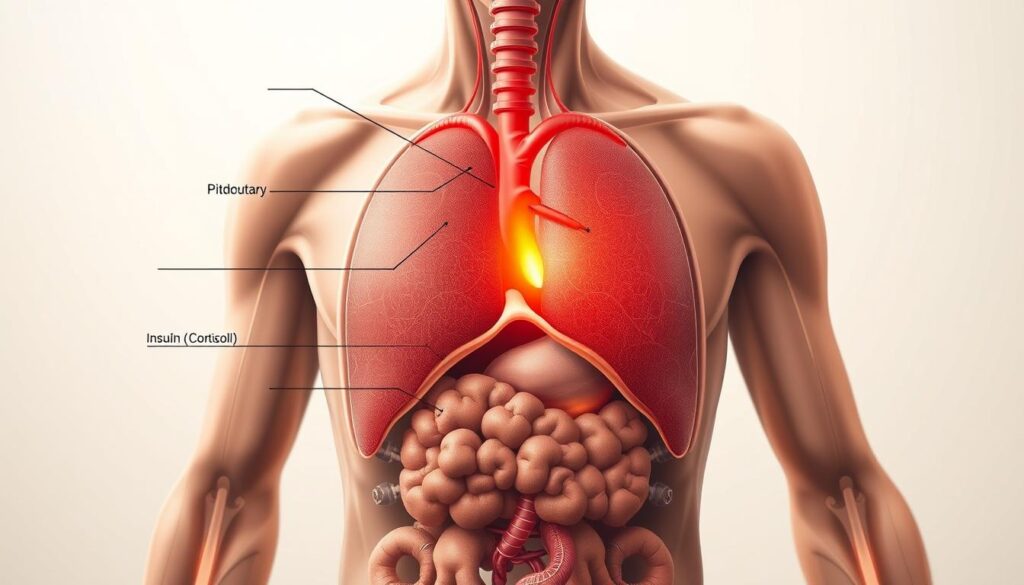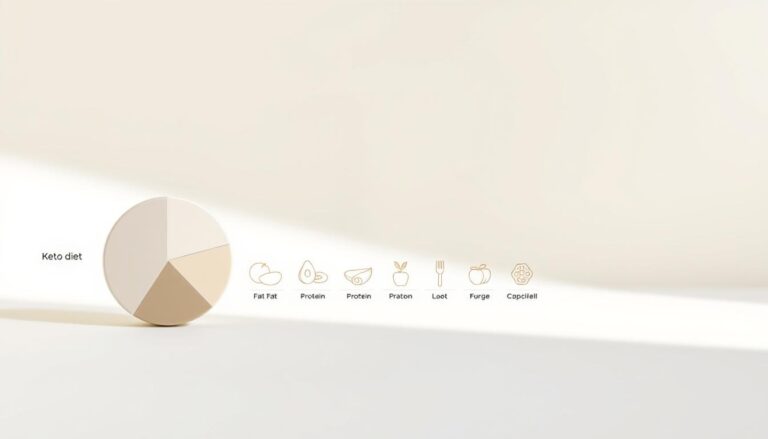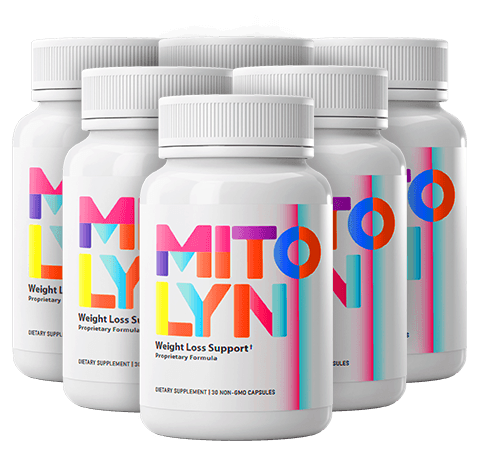
When you start the keto diet, you might wonder what changes in your body. The keto diet affects your body in many ways. Knowing these changes can help you adjust to this new diet.
Going keto means eating less carbs and more fats. This diet has become popular for boosting energy and helping with weight loss. Learning about keto’s effects on your body can help you make better choices. This way, you can enjoy the diet’s health benefits.
We’ll look at how your body changes when you go keto. We’ll also talk about how keto affects your health. This will give you a full picture of what happens to your body on the keto diet and its benefits.
Understanding the Ketogenic Diet Basics
The ketogenic diet makes your body burn fat for energy instead of carbs. This leads to big keto diet impact on metabolism. It also makes your body produce ketones from fat.
These changes can cause weight loss and better blood sugar control. It’s all about how your body works differently.
To get into ketosis, you need to know the right food mix. It’s mostly fat, some protein, and a little carbs. This mix helps your body stay healthy and feel good.
What Does “Going Keto” Really Mean?
Going keto means eating to make your body burn fat for energy. This change can boost your energy and help you manage your weight.
The Science Behind Ketosis
Ketosis is a complex process. It involves making ketones from fat in your liver. This is key for your body to work well and stay healthy.
Key Macronutrient Ratios
The ketogenic diet needs a certain food mix:
- 70-80% fat
- 15-20% protein
- 5-10% carbohydrates
Sticking to these ratios helps your body get into ketosis. This leads to big health benefits and changes in your body.
The Initial Transition Phase: What to Expect
Starting a ketogenic diet changes your body in many ways. At first, it can be tough. Your body learns to use fat instead of carbs, making ketones. You might feel tired, have headaches, or feel sick to your stomach. But these feelings usually go away in a few days.
Creating ketones is a natural part of this change. Knowing how your body works with this diet is key. As you get used to it, you’ll feel more energetic and want carbs less. It’s important to drink lots of water and listen to your body during this time. It can be hard to get used to.
Some common signs you might see at first include:
- Fatigue and lethargy
- Headaches and nausea
- Dizziness and lightheadedness
These symptoms are short-lived. Drinking more water, eating more salt, and resting can help.
As you get used to the diet, your body starts to change for the better. Knowing about ketosis and its effects is important. Being ready for symptoms and challenges helps you make it through and see great results.
What Happens to Your Body When You Go Keto? A Timeline of Changes
Starting a keto diet changes your body a lot. It learns to use fat for energy instead of carbs. Knowing these changes helps you adjust and enjoy the benefits.
Days 1-3: The Carb Withdrawal
In the first days, you might feel tired, have headaches, or feel sick. This is okay. Just drink lots of water and listen to your body.
Days 4-7: Entering Ketosis
After a few days, your body starts burning fat for energy. This is called ketosis. You might feel more awake, clear-headed, and happy.
Weeks 2-4: Becoming Fat-Adapted
After two to four weeks, you’ll see big improvements. You’ll have more energy, lose weight, and feel better overall. Your hormones will also change for the better.

- Days 1-3: Carb withdrawal and initial adaptation
- Days 4-7: Entering ketosis and increased ketone production
- Weeks 2-4: Becoming fat-adapted and experiencing improved energy and weight loss
Knowing what happens to your body on a keto diet helps you adjust. Stay hydrated, listen to your body, and be patient. The benefits are worth it.
Changes in Your Brain and Mental Clarity
The ketogenic diet boosts brain function and mental clarity. It increases ketones, which improve insulin sensitivity. This can lower the risk of brain diseases.
The diet changes how the body gets energy. It moves from glucose to ketones.
Key benefits for the brain include:
- Increased production of brain-derived neurotrophic factor (BDNF), which is involved in the growth and maintenance of brain cells
- Improved cognitive function and mental clarity
- Reduced risk of neurodegenerative diseases such as Alzheimer’s and Parkinson’s
The ketogenic diet greatly improves brain health and mental clarity. It’s a top choice for better health and wellbeing.
By understanding the keto diet impact on metabolism and the ketogenic diet health benefits, individuals can make informed decisions about their diet and lifestyle.
| Benefit | Description |
|---|---|
| Improved cognitive function | The ketogenic diet can improve cognitive function and mental clarity by increasing the production of BDNF and improving insulin sensitivity. |
| Reduced risk of neurodegenerative diseases | The keto diet can reduce the risk of neurodegenerative diseases such as Alzheimer’s and Parkinson’s by improving insulin sensitivity and reducing inflammation. |
How Ketosis Affects Your Energy Levels
When your body goes into ketosis, it changes how it gets energy. It starts using fat instead of sugar, which lasts longer. This leads to more energy and clearer thinking for many on the keto diet.
The keto diet body changes can be big, with a boost in energy early on. This is because the body gets better at using fat for energy.
The Switch from Sugar to Fat Burning
This change is good for health and feeling well. It helps with sports, energy, and thinking clearly.
Sustained vs. Fluctuating Energy
The keto diet keeps energy steady all day. This is different from high-carb diets, which can make energy go up and down. The keto diet helps you stay focused and productive.
Athletic Performance Changes
The keto diet also boosts sports performance. It makes more ketones, which muscles use for energy. This means better endurance and less tiredness, great for athletes and active people.
| Energy Source | Energy Levels | Athletic Performance |
|---|---|---|
| Sugar | Fluctuating | Reduced endurance |
| Fat | Sustained | Improved endurance |
Impact on Your Digestive System
The ketogenic diet can greatly affect your body, especially your digestive system. Eating a lot of fat can make more bile. This can help digest food better and lower the chance of gallstones. Improved digestion is a big plus of the ketogenic diet. It’s important to know how it works.
Some key benefits of the ketogenic diet for your digestive system are:
- Less inflammation in the digestive tract, which can help with irritable bowel syndrome (IBS) and other issues
- More bile production, which can aid digestion and lower gallstone risk
- Better nutrient absorption, which supports health and well-being
The keto diet also affects hormones, which can help your digestion. It can regulate hormones that control digestion and hunger. This can lead to better digestion and fewer digestive problems. 
In summary, the ketogenic diet can greatly impact your digestive system. It’s crucial to understand its effects and benefits for your health. By following a well-planned ketogenic diet, you can enjoy better digestion, less inflammation, and better nutrient absorption. These can all help improve your overall health and well-being.
Hormonal Changes During Ketosis
Starting a keto diet changes your body a lot, especially in hormones. These changes help your health and make you feel better. This is why many people like the keto diet health benefits.
The keto diet changes many hormones. These include hormones that help with sugar, hunger, and how your body works. Knowing about these changes helps you get the most from a keto lifestyle.
Insulin Response
Insulin, which controls blood sugar, goes down on a keto diet. This can make your body better at using insulin. It also lowers the chance of getting type 2 diabetes.
Hunger Hormones
The keto diet also changes hunger hormones. It lowers ghrelin, the hunger hormone, and raises leptin, the fullness hormone. This helps you feel less hungry and can help you lose weight.
Thyroid Function
Also, the keto diet might help your thyroid work better. This can improve your metabolism and lower the risk of hypothyroidism. This is good for people with thyroid problems, as it can help with their symptoms.

In short, the hormonal changes in ketosis are key to the keto diet health benefits. By understanding and managing these changes, you can make the most of a keto lifestyle.
| Hormone | Effect of Ketogenic Diet |
|---|---|
| Insulin | Reduced production, improved insulin sensitivity |
| Ghrelin | Decreased levels, reduced hunger |
| Leptin | Increased levels, enhanced feelings of fullness |
| Thyroid Hormones | Potential improvement in thyroid function, metabolism |
Effects on Body Composition and Weight
The keto diet changes how your body uses energy. It uses less carbs and more fat. This helps you manage your weight and body shape better.
One big change is lower insulin levels. This makes your body burn fat more easily. You might lose weight and feel healthier. The diet also lowers inflammation, helping with weight loss and better body shape.
Some key benefits of the keto diet include:
- Reduced body fat percentage
- Increased muscle mass
- Improved weight management
- Enhanced overall health and well-being
But, the keto diet isn’t for everyone. Always talk to a doctor before starting it. If you do try it, you might see big changes in your body and weight.
| Benefit | Description |
|---|---|
| Weight Loss | The keto diet can help with weight loss by reducing insulin levels and increasing fat burning. |
| Improved Body Composition | The keto diet can help improve body composition by increasing muscle mass and reducing body fat percentage. |
| Enhanced Overall Health | The keto diet has been shown to reduce inflammation and improve overall health and well-being. |
Changes in Blood Chemistry and Heart Health
The ketogenic diet can change your body a lot, especially in blood chemistry and heart health. As you get used to the keto diet, your health can get better. One big plus is that HDL, or “good” cholesterol, goes up. This can lower the risk of heart disease.
Some big changes in the body include:
- Increased production of HDL cholesterol
- Reduced blood pressure
- Improved blood sugar regulation
These changes can make you healthier. They can lower the risk of heart disease and type 2 diabetes. The keto diet can also make you feel more energetic and clear-minded.
Remember, the ketogenic diet isn’t for everyone. Always talk to a doctor before starting any new diet. With the right help, the keto diet can really improve your health and happiness.
Studies show the keto diet can really cut down triglycerides and LDL cholesterol. It can also raise HDL cholesterol. Here’s a table with some key findings:
| Cholesterol Type | Average Reduction |
|---|---|
| Triglycerides | 30-40% |
| LDL Cholesterol | 20-30% |
| HDL Cholesterol | 10-20% increase |
The keto diet can really change your body, especially in blood chemistry and heart health. Knowing how the keto diet changes your body can help you make better health choices.
Common Physical Signs of Ketosis
When you start a ketogenic diet, your body changes a lot. This leads to different signs of ketosis. The keto diet effects on hormones can change how you feel, like your energy and digestion. You might feel tired, have bad breath, or feel sick at first.
But these feelings don’t last long. Soon, you’ll start to feel better. You might have more energy, lose weight, and feel less hungry. Some signs of ketosis include:
- Increased energy levels
- Improved mental clarity
- Reduced hunger and cravings
- Improved digestion
By understanding the physical signs of ketosis, individuals can better navigate the transition to a ketogenic diet and enjoy the numerous health benefits it provides.
| Physical Sign | Description |
|---|---|
| Bad Breath | Caused by the production of acetone, a ketone body |
| Fatigue | Temporary symptom as the body adapts to the new diet |
| Nausea | Common symptom during the initial transition phase |
Potential Side Effects and How to Address Them
Starting a keto diet can lead to side effects. The body changes a lot, and knowing these changes is key. This helps you deal with any problems that come up.
“Keto flu” is a common side effect. It happens when your body starts using fat for energy instead of carbs. You might also get muscle cramps and feel very tired because of not enough electrolytes. Also, your stomach might get upset, leading to diarrhea or constipation.
To avoid these issues, drink lots of water and make sure you have enough electrolytes. Pay attention to how your body feels. A well-thought-out keto diet can help you avoid most problems. Knowing what to expect can help you handle any side effects that come up.
- Stay hydrated by drinking plenty of water
- Replenish electrolytes through supplements or electrolyte-rich foods
- Listen to your body and adjust your diet as needed
Being aware of possible side effects and taking steps to prevent them can make your keto diet journey better. It helps you stay healthy and successful.
| Side Effect | Symptoms | Remedies |
|---|---|---|
| Keto Flu | Headaches, fatigue, nausea | Stay hydrated, replenish electrolytes |
| Electrolyte Imbalances | Muscle cramps, fatigue | Replenish electrolytes through supplements or foods |
| Digestive Adjustments | Diarrhea, constipation | Listen to your body, adjust diet as needed |
Conclusion: Embracing Your Body’s Keto Adaptation
The ketogenic diet can change your body in many ways. It can improve your energy, help with weight, and even your heart and brain. Knowing how your body changes and the science of ketosis helps you enjoy these benefits more.
Don’t think of the ketogenic diet as a quick solution. It’s a long-term choice for better health. Listen to your body and make changes when you need to. This way, you can get the most out of keto-adaptation. Enjoy the journey, celebrate your wins, and see the amazing health benefits of ketosis.















